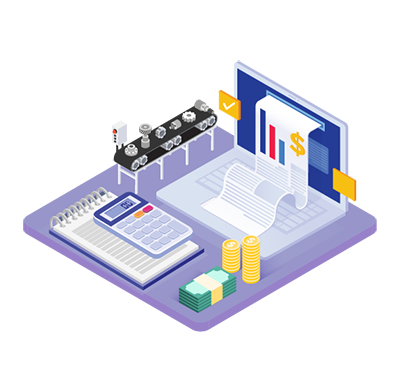ERP Pricing Calculator
Use our ERP pricing calculator to get a ballpark cost based on your company’s profile.

Everyone wants to know what an ERP system will cost them. Most manufacturers believe ERPs are expensive and often get frustrated when vendors don’t give them real numbers upfront.
We understand this frustration — but the truth is that ERP costs can vary widely depending on a number of factors, such as the size of your business, your specific needs and the type of system you choose (cloud-based ERP vs. on-premise or generic vs. industry-specific, for example). ERP implementation costs will also vary by circumstance and can change depending on whether you are implementing your first ERP system or replacing a current system.
But we’re here to help — and we promise — give you real numbers. Keep reading our guide to learn more about ERP pricing. Or, if you really want to get to brass tacks, use our pricing calculator to find out how much a manufacturing ERP system will cost you.
Use our ERP pricing calculator to get a ballpark cost based on your company’s profile.

According to a 2022 survey of 1,384 ERP projects by Software Path, the average price of an ERP system is $9,000 per user.
Before you whip out your calculator and start multiplying that figure by the number of employees at your company to try to figure out your costs, it’s important to understand that this is an average cost over five years for businesses of all shapes and sizes across many industries — and probably won’t reflect your manufacturing company.
ERP pricing for a manufacturing company depends on a variety of factors, including what type of manufacturing you do (ETO, CTO, MTO, etc), how many shop floor versus back-office employees you have, and what modules and integrations you need. (To find more accurate pricing for your manufacturing business, use our pricing calculator).
Manufacturing ERP solutions come with many benefits, but ERP systems for manufacturers also tend to be more expensive.
Why?
Manufacturers have complex needs that other industries simply don’t have to deal with, such as managing raw materials and component inventories, complicated scheduling, maintaining machinery and equipment, and handling distribution. It’s not uncommon for a new CEO or CFO of a manufacturing company, coming from a background in distribution or services, to experience sticker shock when shopping for an ERP system. This is because manufacturing ERPs require more modules and functionalities, which is more expensive than software designed for less complex industries.
An ERP system is one of the biggest investments that a manufacturer will ever make — but it will pay off in the long run. Though difficult to calculate, the ROI of an ERP system is immense, and manufacturers will see a significant reduction in costs after implementing an ERP system.

For a small business, the cost of an ERP solution typically ranges from $40,000 to $150,000. Mid-sized businesses might invest up to $325,000, while large enterprises should be prepared to spend between $1 million and $10 million. As always, these figures are general estimates, as no two projects are the same.
Understanding the cost of an ERP system for small to mid-sized manufacturing businesses requires a comprehensive look at the total cost of ownership (TCO) over several years.
TCO includes not just the initial purchase price but also implementation costs, training, and ongoing maintenance. To grasp the full scope of ERP costs, consider the following simple TCO calculation:
TCO = Purchase price + Implementation costs + Operating costs over 5-10 years
Here’s a breakdown of what you can expect:
Purchase Price: This is the basic price of purchasing the ERP software required to meet your business needs.
Implementation Costs: Implementing an ERP system involves customizing the software to fit your specific business processes, integrating it with existing systems, and migrating data. These costs can often be as much as the purchase price itself.
Training: Adequate training ensures your team can effectively use the new ERP system. This can include formal training sessions, user manuals, and ongoing support. Training costs will vary depending on the complexity of the system and the size of your team.
Ongoing Maintenance: This includes software updates, technical support, and possible additional customizations as your business grows. Maintenance costs are typically a recurring expense that must be factored into your annual budget.
Additional costs to consider, when budgeting and planning for an ERP, include:
While not all of these will apply to every ERP project, they should be considered in order for you to decide which ERP is right for your business. You also need to consider hidden costs and make room for contingencies.
By calculating the TCO and considering these components, you can better plan and budget for your ERP investment, ensuring you get a solution that meets your needs while providing a clear picture of the long-term financial commitment.
When selecting an ERP system, look closely at ERP pricing models. Some ERP vendors use a perpetual licensing model with a high initial cost, while others have a subscription licensing model with lower upfront costs but higher annual fees.
Both models have their pros and cons. Subscription-based pricing spreads out costs over time, helping small to mid-sized companies manage cash flow and providing flexibility for future upgrades or scaling. However, it can be more expensive in the long run.
Perpetual licensing involves a larger upfront investment but lower annual costs, covering only upgrades and maintenance. This model ensures you own the software, reducing the risk of losing access to your data.
Perpetual Licensing:
Subscription-Based Licensing:
Deciding between cloud-based and on-premise ERP significantly impacts your system’s overall cost.
Each option has its pros and cons, so choose based on your budget, IT capabilities, and specific business needs.
Generic ERP systems, often from major brands, offer extensive features adaptable to various industries but usually require significant and expensive customizations and add-ons.
In contrast, industry-specific ERP systems cater to the unique needs of a particular industry. Developed by niche companies with deep industry expertise, these systems are ideal for small and medium-sized businesses. They provide tailored functionalities without lengthy and costly customizations, leading to shorter implementation times, reduced costs, and improved efficiency.
For manufacturers, a manufacturing-specific ERP delivers essential features like product engineering, quoting, job costing, and shop-floor scheduling, offering higher functionality at a lower price than generic ERPs.
Avoid being oversold on unnecessary features: Some ERP features may sound interesting but may never be used. To establish the appropriate ERP budget and invest wisely, select the features that you require now (or in the near future). Manufacturers typically require MES-shopfloor, MRP, scheduling, purchasing, accounting, financial management, and inventory management tools. Additional useful features might include an integrated CAD module, a CRM for sales management, or embedded analytics tools.
But be sure to consider your future needs, too. Features like multi-currency or multilingual capabilities might not be necessary right now but could be more cost-effective to include upfront if your business plans to expand into new markets soon.
Budgeting for an ERP implementation project depends on several factors, and the ERP price can vary depending on several factors including the type of ERP system chosen, the pricing model, implementation costs, and and customization fees. Replacing an existing ERP often requires special consultant attention to prevent operational disruption and may take longer than implementing a new system.
Implementation and professional services costs include consulting, training, and support. Consulting fees cover business analysis, training fees encompass user training and simulations, and support fees include data migration and customizations. These costs vary widely based on system complexity, customization needs, and training methods. On-site training is expensive, whereas online training is more affordable and flexible. A blend of both often works best, providing flexibility and access to specialized consultants.
A good rule of thumb is to budget 1-2% of your annual revenue for a new ERP system. For a company with $5 million in annual revenue, this translates to an ERP investment of $50,000 to $100,000, depending on the system and customization required.
When planning your ERP budget, allocate funds for unforeseen costs. The hard truth is that ERP implementation is a significant undertaking that will disrupt daily operations. Set aside money for employee wages during training, unexpected customizations, and process reengineering. Allocate an additional 10-15% of your total project budget for these unexpected expenses.
Unforeseen Costs of ERP:
Unforeseen Ongoing Costs:
Ready to find out the cost of an ERP system for your manufacturing business?
Try out our new pricing calculator to get a ballpark estimate based on your company’s profile.
"*" indicates required fields